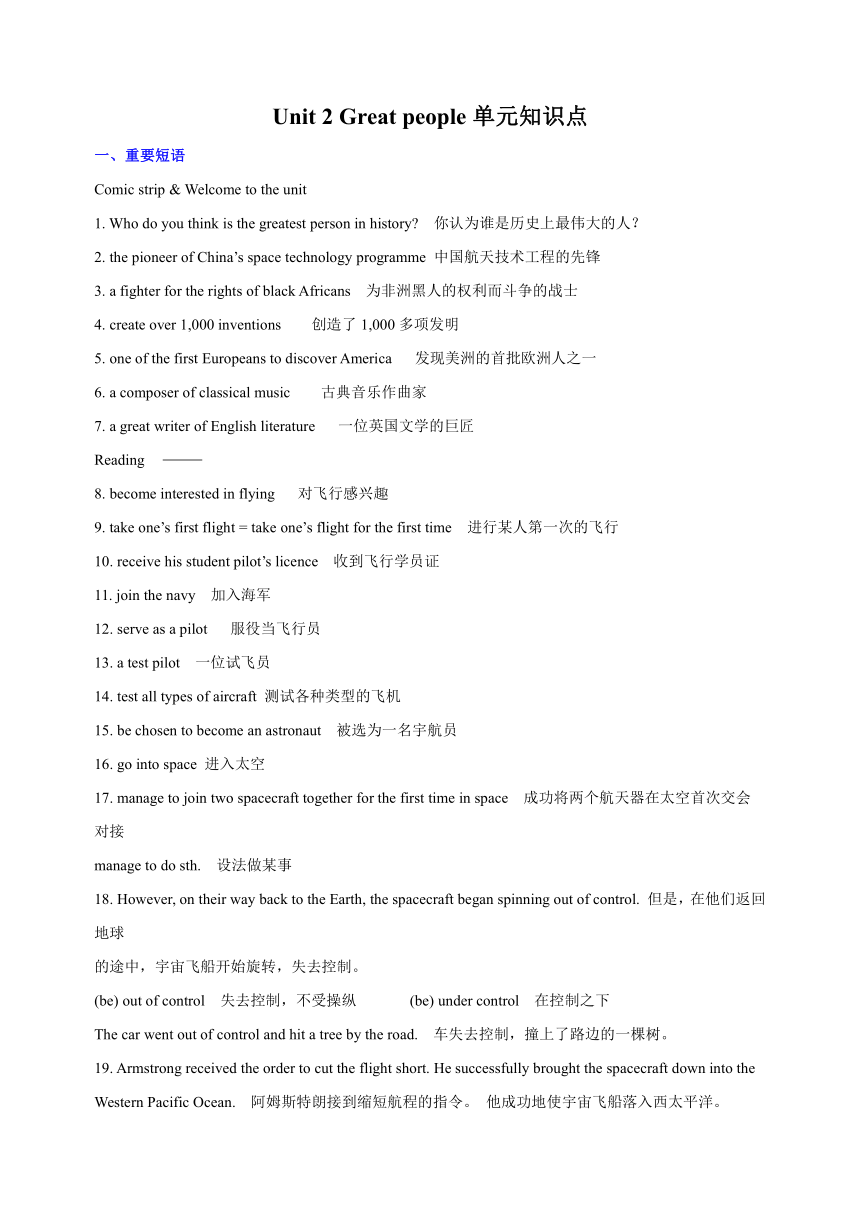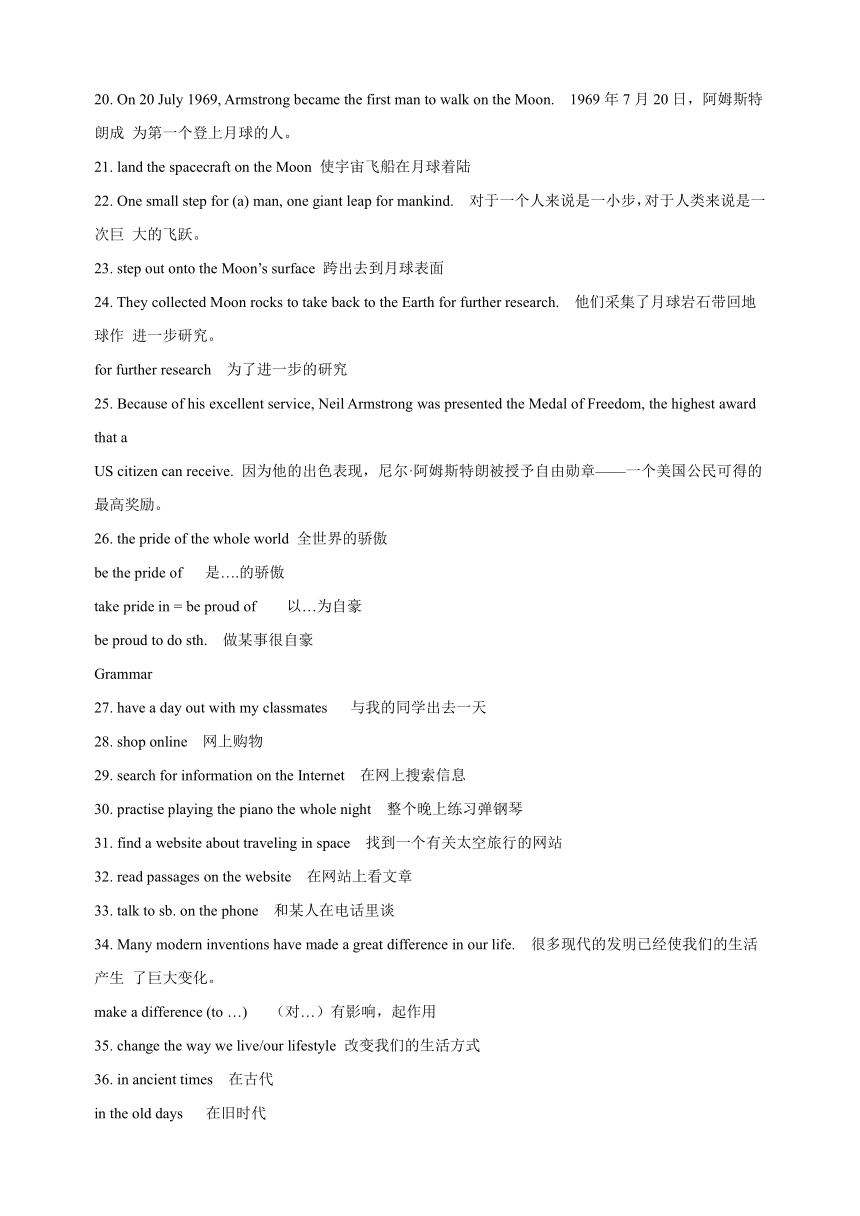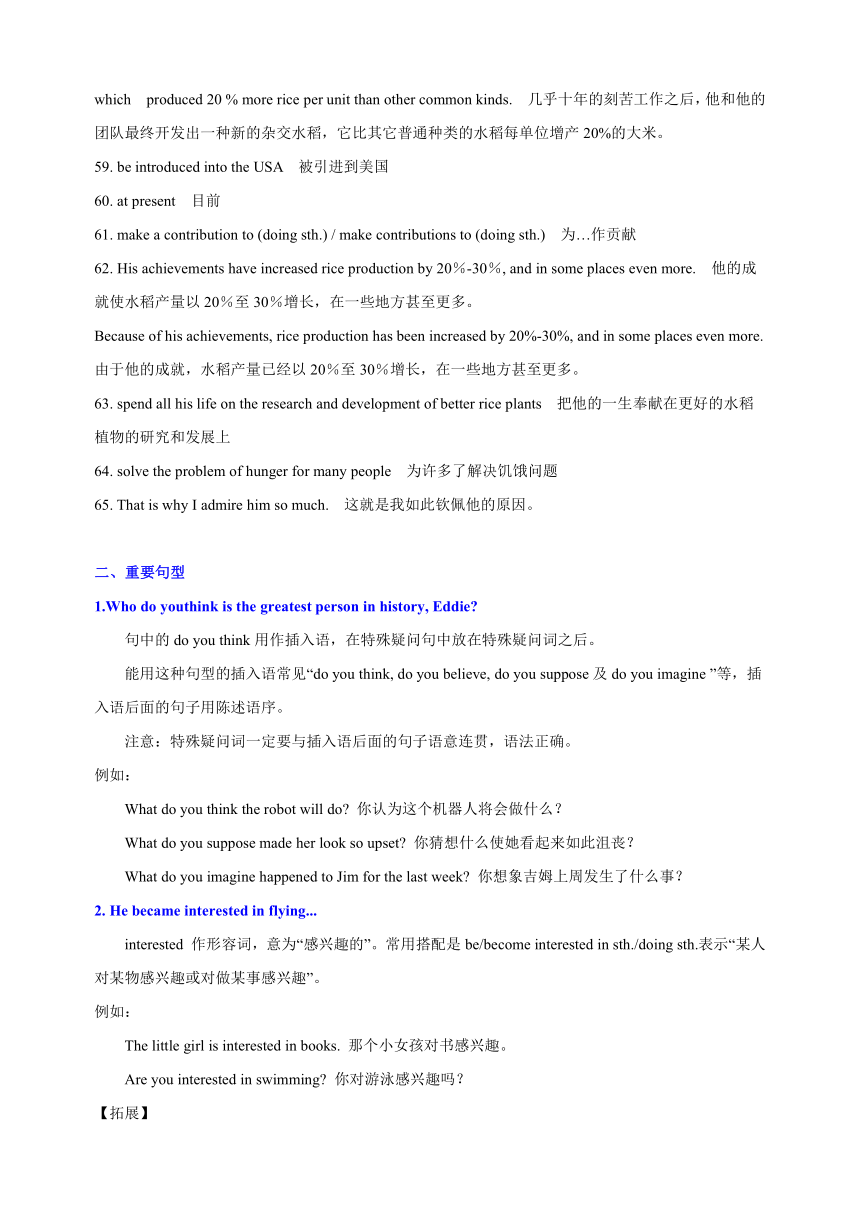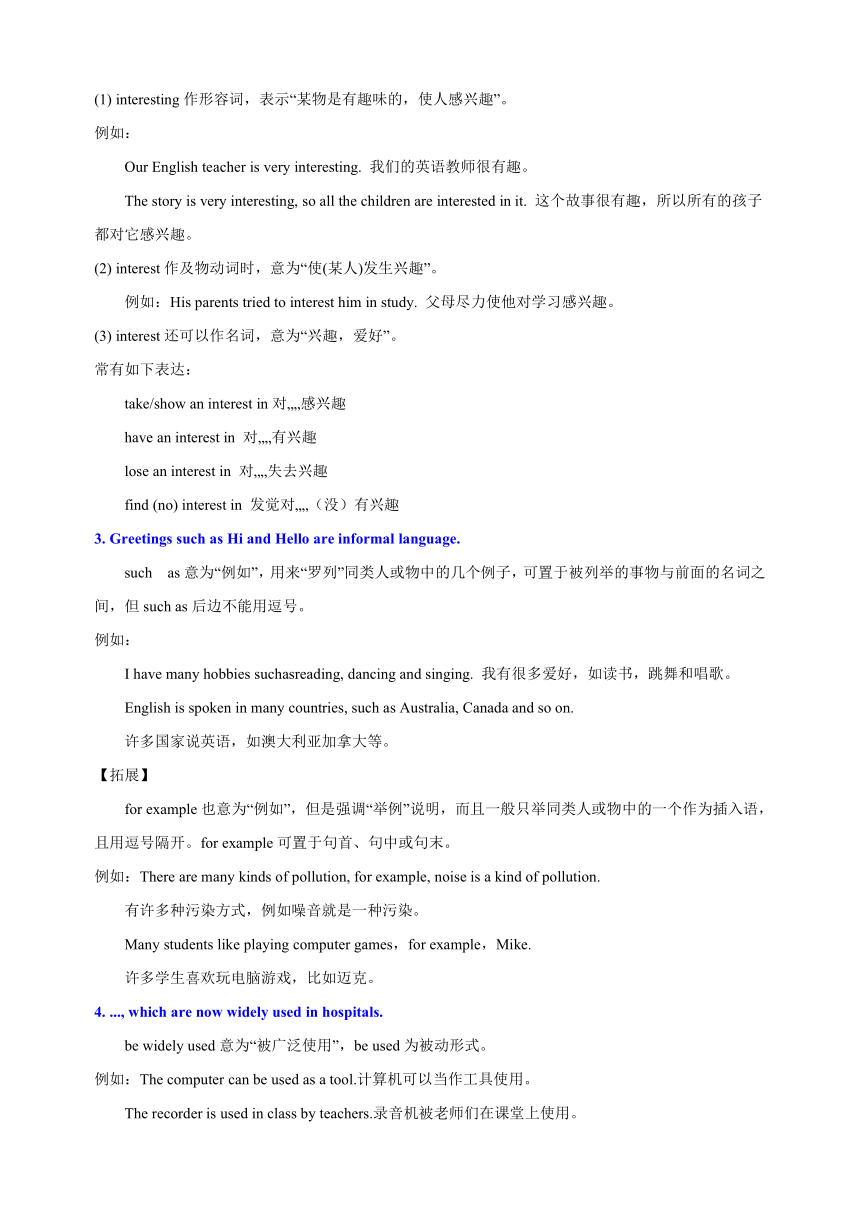译林版九年级下册Unit2 Great people 单元知识点讲义
文档属性
| 名称 | 译林版九年级下册Unit2 Great people 单元知识点讲义 |

|
|
| 格式 | doc | ||
| 文件大小 | 67.5KB | ||
| 资源类型 | 教案 | ||
| 版本资源 | 牛津译林版 | ||
| 科目 | 英语 | ||
| 更新时间 | 2024-03-19 19:34:24 | ||
图片预览





文档简介
Unit 2 Great people单元知识点
一、重要短语
Comic strip & Welcome to the unit
1. Who do you think is the greatest person in history 你认为谁是历史上最伟大的人?
2. the pioneer of China’s space technology programme 中国航天技术工程的先锋
3. a fighter for the rights of black Africans 为非洲黑人的权利而斗争的战士
4. create over 1,000 inventions 创造了1,000多项发明
5. one of the first Europeans to discover America 发现美洲的首批欧洲人之一
6. a composer of classical music 古典音乐作曲家
7. a great writer of English literature 一位英国文学的巨匠
Reading
8. become interested in flying 对飞行感兴趣
9. take one’s first flight = take one’s flight for the first time 进行某人第一次的飞行
10. receive his student pilot’s licence 收到飞行学员证
11. join the navy 加入海军
12. serve as a pilot 服役当飞行员
13. a test pilot 一位试飞员
14. test all types of aircraft 测试各种类型的飞机
15. be chosen to become an astronaut 被选为一名宇航员
16. go into space 进入太空
17. manage to join two spacecraft together for the first time in space 成功将两个航天器在太空首次交会对接
manage to do sth. 设法做某事
18. However, on their way back to the Earth, the spacecraft began spinning out of control. 但是,在他们返回地球
的途中,宇宙飞船开始旋转,失去控制。
(be) out of control 失去控制,不受操纵 (be) under control 在控制之下
The car went out of control and hit a tree by the road. 车失去控制,撞上了路边的一棵树。
19. Armstrong received the order to cut the flight short. He successfully brought the spacecraft down into the
Western Pacific Ocean. 阿姆斯特朗接到缩短航程的指令。 他成功地使宇宙飞船落入西太平洋。
20. On 20 July 1969, Armstrong became the first man to walk on the Moon. 1969年7月20日,阿姆斯特朗成 为第一个登上月球的人。
21. land the spacecraft on the Moon 使宇宙飞船在月球着陆
22. One small step for (a) man, one giant leap for mankind. 对于一个人来说是一小步,对于人类来说是一次巨 大的飞跃。
23. step out onto the Moon’s surface 跨出去到月球表面
24. They collected Moon rocks to take back to the Earth for further research. 他们采集了月球岩石带回地球作 进一步研究。
for further research 为了进一步的研究
25. Because of his excellent service, Neil Armstrong was presented the Medal of Freedom, the highest award that a
US citizen can receive. 因为他的出色表现,尼尔·阿姆斯特朗被授予自由勋章——一个美国公民可得的最高奖励。
26. the pride of the whole world 全世界的骄傲
be the pride of 是….的骄傲
take pride in = be proud of 以…为自豪
be proud to do sth. 做某事很自豪
Grammar
27. have a day out with my classmates 与我的同学出去一天
28. shop online 网上购物
29. search for information on the Internet 在网上搜索信息
30. practise playing the piano the whole night 整个晚上练习弹钢琴
31. find a website about traveling in space 找到一个有关太空旅行的网站
32. read passages on the website 在网站上看文章
33. talk to sb. on the phone 和某人在电话里谈
34. Many modern inventions have made a great difference in our life. 很多现代的发明已经使我们的生活产生 了巨大变化。
make a difference (to …) (对…)有影响,起作用
35. change the way we live/our lifestyle 改变我们的生活方式
36. in ancient times 在古代
in the old days 在旧时代
37. use salt to help them keep fish or meat for a longer time 用盐帮助他们使鱼或肉保存更长的时间
38. go bad 变坏/质
39. wash their clothes by hand 手工洗衣服
40. with the invention/development of… 随着…的发明/随着…的发展
Integrated skills
41. win the Nobel Prize twice during her lifetime 在她一生中两次获得诺贝尔奖
42. She was the youngest of five children. 她是五个孩子中最小的。
43. a science professor 一位科学教授
44. died at the age of 67 67岁时去世
died on 4 July 1934, aged 67. 死于1934年七月4日,享年67岁。
45. the discovery of radium 镭元素的发现
46. win the Nobel Prize for Physics/ Chemistry 因为物理学/化学荣获诺贝尔奖
47. die in a traffic accident 在一场交通事故中去世
48. the end of the story 故事的结局
49. It was brave of him to go to a place that was unknown to humans at that time. 她很勇敢,到一个当时人类未知 的地方去。
be unknown to humans 不为人类所知
50. She also pushed for the use of X-ray machines, which are now widely used in hospitals. 她(居里夫人)还推 动了X光设备的使用,这种设备现已在医院广泛应用。
push for the use of 推动…的使用
be widely used 被广泛使用
Task
51. a rice scientist 一位水稻科学家
52. one of the greatest people that have ever lived 在史以来最伟大的人之一
53. work as a teacher in an agriculture school after graduating/he graduated from college 大学毕业后在一所农业 学校当老师
54. see people die of hunger 看到人们死于饥饿
55. begin research into hybrid rice 开始研究杂交水稻
56. happen to do sth. 碰巧做某事
57. have many advantages over others 比其它(水稻)有优势
58. After nearly ten years of hard work, he and his team finally developed a new type of hybrid rice plant, which produced 20 % more rice per unit than other common kinds. 几乎十年的刻苦工作之后,他和他的团队最终开发出一种新的杂交水稻,它比其它普通种类的水稻每单位增产20%的大米。
59. be introduced into the USA 被引进到美国
60. at present 目前
61. make a contribution to (doing sth.) / make contributions to (doing sth.) 为…作贡献
62. His achievements have increased rice production by 20%-30%, and in some places even more. 他的成就使水稻产量以20%至30%增长,在一些地方甚至更多。
Because of his achievements, rice production has been increased by 20%-30%, and in some places even more.
由于他的成就,水稻产量已经以20%至30%增长,在一些地方甚至更多。
63. spend all his life on the research and development of better rice plants 把他的一生奉献在更好的水稻植物的研究和发展上
64. solve the problem of hunger for many people 为许多了解决饥饿问题
65. That is why I admire him so much. 这就是我如此钦佩他的原因。
二、重要句型
1.Who do youthink is the greatest person in history, Eddie
句中的do you think用作插入语,在特殊疑问句中放在特殊疑问词之后。
能用这种句型的插入语常见“do you think, do you believe, do you suppose及do you imagine ”等,插入语后面的句子用陈述语序。
注意:特殊疑问词一定要与插入语后面的句子语意连贯,语法正确。
例如:
What do you think the robot will do 你认为这个机器人将会做什么?
What do you suppose made her look so upset 你猜想什么使她看起来如此沮丧?
What do you imagine happened to Jim for the last week 你想象吉姆上周发生了什么事?
2. He became interested in flying...
interested 作形容词,意为“感兴趣的”。常用搭配是be/become interested in sth./doing sth.表示“某人对某物感兴趣或对做某事感兴趣”。
例如:
The little girl is interested in books. 那个小女孩对书感兴趣。
Are you interested in swimming 你对游泳感兴趣吗?
【拓展】
(1) interesting作形容词,表示“某物是有趣味的,使人感兴趣”。
例如:
Our English teacher is very interesting. 我们的英语教师很有趣。
The story is very interesting, so all the children are interested in it. 这个故事很有趣,所以所有的孩子都对它感兴趣。
(2) interest作及物动词时,意为“使(某人)发生兴趣”。
例如:His parents tried to interest him in study. 父母尽力使他对学习感兴趣。
(3) interest还可以作名词,意为“兴趣,爱好”。
常有如下表达:
take/show an interest in对 感兴趣
have an interest in 对 有兴趣
lose an interest in 对 失去兴趣
find (no) interest in 发觉对 (没)有兴趣
3. Greetings such as Hi and Hello are informal language.
such as意为“例如”,用来“罗列”同类人或物中的几个例子,可置于被列举的事物与前面的名词之间,但such as后边不能用逗号。
例如:
I have many hobbies suchasreading, dancing and singing. 我有很多爱好,如读书,跳舞和唱歌。
English is spoken in many countries, such as Australia, Canada and so on.
许多国家说英语,如澳大利亚加拿大等。
【拓展】
for example也意为“例如”,但是强调“举例”说明,而且一般只举同类人或物中的一个作为插入语,且用逗号隔开。for example可置于句首、句中或句末。
例如:There are many kinds of pollution, for example, noise is a kind of pollution.
有许多种污染方式,例如噪音就是一种污染。
Many students like playing computer games,for example,Mike.
许多学生喜欢玩电脑游戏,比如迈克。
4. ..., which are now widely used in hospitals.
be widely used意为“被广泛使用”,be used为被动形式。
例如:The computer can be used as a tool.计算机可以当作工具使用。
The recorder is used in class by teachers.录音机被老师们在课堂上使用。
【拓展】
(1) be used to do sth.意为“被用来做某事”,是一种被动形式。
例如:The waste water is used to water flowers. 废水被用来浇花。
(2) be used to doing sth.意为“习惯于做某事”,多指现在的情况。
例如:
My father is used to watching TV after supper. 我父亲晚饭之后习惯看电视。
He is used to living in the country. 他习惯住在农村。
(3) used to do sth.意为“过去常常做某事”,与现在作比较,暗含“现在不做了”之意。
例如:I used to go to school by bus. 我过去常常乘公共汽车去学校。
He used to get up at 6:00 when he was in the countryside. 他在乡下时常常六点钟起床。
5. However, the real Harry Potter says the Harry Potter series ...
however作副词,意为“不过;然而”,有转折的含义,相当于but,可位于句首、句中和句末。位于句首时,其后用逗号隔开;位于句中时,其前用分号或逗号,其后用逗号隔开;位于句末时,其前用逗号隔开。但but只能置于句首或句中。
例如:My father, however, did not agree. 但是,我父亲不同意。
My room is small. However, it’s comfortable. 我的房间小,但很舒服。
【拓展】however作副词,还可以意为“无论如何,不管怎样”,用来修饰形容词或副词,其词序为:however+形容词或副词+主语+谓语。
however 引导让步状语从句,与no matter how 相当。
例如:
Phone me when you arrive, however late it is.你到达之后就给我打电话,不论多么晚也要打。
However much he eats, he never gets fat.不管他吃多少,他永远吃不胖。
三、语法
Part A
对比:
一般现在时 Simple present
现在进行时 Present continuous
1.一般现在时
表示主语经常性和习惯性的动作或目前存在的状态,也表示客观的自然现象。
现在进行时:表示说话时正在进行的动作, 也表示目前或现阶段一直进行的动作。
eg: She often does her homework in the evening. 她经常在晚上做作业。
She is doing her homework now. 现在她正在做作业。
一般现在时
(1) be动词的一般现在时形式:is, am, are
(2) 其他实义动词的一般现在时形式:
动词原形或第三人称单数形式
2. 现在进行时
be动词(am /is /are+ 动词的ing形式(现在分词)
主语是第三人称单数时,行为动词的变化规则如下:
一般动词在词尾加-s,如: helps, makes, gets, swims, knows, plays等.
以s, x, ch, sh, 或o结尾的动词在词尾加-es,如dresses, washes, catches, does等.
以辅音字母+y结尾的动词, 先变y为i,再加-es, 如fly---flies, study--- studies等.
动词+ing的变化规则如下:
一般动词在词尾加-ing,如: helping, playing等.
以不发音的e结尾的动词-e +ing,如drive—driving, make--making等.
以重读闭音节结尾的动词, 双写尾字母再加ing, 如get—getting; stop---stopping等.
以ie结尾的动词,去掉ie+ying.
时间状语不同
1.一般现在时的时间状语主要有:
always, usually, sometimes, never, every day,
on Sundays, in the morning/afternoon/evening等
2. 现在进行时的时间状语主要有:
now, right now, at present, at the moment
有时句首有Look! Listen! 或 It’s +时 刻; Where is sb
Part B:
一般过去时 VS 过去进行时
1.一般过去时的概念为:
过去发生的动作或存在的状态;
如:Two months ago, I flew to London with my friend. 两个月前,我和我的朋友一起坐飞机去了伦敦。
I went home by bus yesterday. 昨天我是坐公交车回家的。
2.过去进行时的概念为:
表示过去某个时刻正在发生的动作。过去同一时间里同时发生的的动作或在过去某个时间段内持续发生的动作或存在的状态。
如: I was watching TV from 7p.m to 8p.m. last night. 昨晚七点到八点我在看电视。
She was reading while her mother was talking on the phone. 当她妈妈在打电话的时候,她在看书。
形式结构上的区别:
1.一般过去时的形式结构为:主语+动词的过去式+其它。
如:
They were free the day before yesterday, but we were busy. 前天他们很闲,而我们却很忙。
I got up at 6:30 yesterday. 昨天我是六点半起床的。
2.过去进行时的形式结构为:
主语+was/were+动词的现在分词+其它。
如:
What were you doing this time yesterday﹖ 昨天的这个时候你在做什么?
He was drawing an elephant on the blackboard when the teacher came in. 当老师进来时,他正在黑板上画一头大象。
否定句、疑问句结构上的区别
1.一般过去时的否定句、疑问句多是借助助动词did来体现的(be的疑问句和否定句除外),需要注意的是:
此时实义动词应用原形。
如: He worked in Beijing last year.
否定句:He didn‘t work in Beijing last year.
疑问句:Did he work in Beijing last year﹖
反意疑问句:He worked in Beijing last year, didn’t he﹖
2.过去进行时的否定句、疑问句多是借助系动词was或were来体现的(和动词be一般过去时的疑问句和否定句一样)。
如: He was working in the park at eight yesterday morning.
否定句:He wasn’t working in the park at eight yesterday morning.
疑问句:Was he working in the park at eight yesterday morning﹖
反意疑问句:He was working in the park at eight yesterday morning, wasn’t he﹖
用法上的区别
1.过去进行时往往表示动作的未完成性,而一般过去时往往表示动作已完成。
试比较:
David wrote a letter to his father last night.
大卫昨晚给他父亲写了一封信。(信写完了)
David was writing a letter to his father last night.
大卫昨晚正在给他父亲写信。(指信在写的过程中,不一定写完。)
2.一般说来,过去进行时侧重动作持续时间的长度;而一般过去时只说明过去某时发生某事,侧重说明事实。
试比较:
It was raining heavily last night. 昨晚下着大雨。(侧重说明下雨持续的时间长)
It rained heavily last night. 昨天下了大雨。(侧重说明下雨这一事实)
3.在带有all night, the whole morning等强调时间长度的状语时,句中谓语动词用过去进行时更好些。如:
He was working all night last Monday.上周一他整整工作了一个晚上。
Part C
一般过去时与现在完成时的区别
1.概念不同:
一般过去时表示过去某时发生的动作或单纯叙述过去的事情,强调动作;
现在完成时强调过去的事情对现在的影响或结果。
例如:We are good friends(现在情况) 我们是好朋友。
I got to know him in 2005. (过去的动作) 我在2005年认识(结识)他
We have known each other since 2005. (现在完成时把过去的动作和现在联系起来并着眼于现在) 自从2005年来我们就相互认识。
Linda has a big house. (现在情况)
She bought the house ten years ago. (过去的动作)
She has owned the house for ten years.
She has lived in the house for ten years. (现在完成时把过去的动作和现在联系起来并着眼于现在)
2. 时间状语不同:
一般过去时常与具体的时间状语连用,而现在完成时通常与模糊的时间状语连用,或无时间状语。
一般过去时的时间状语:
yesterday,last week,…ago,in1980,in October,just now等,皆为具体的时间状语。
现在完成时的时间状语:
for,since,already,recently,so far,ever,never,just,yet,till/until,up to now,in past years,always等,皆不确定或模糊的时间状语。
3. 用法:
现在完成时可表示持续到现在的动作或状态,动词一般是延续性的,如live,teach, learn,work,study,know.。
一般过去时常用的非持续性动词有come,go,leave,start,die,finish,become,get married等。
I saw this film yesterday. (强调看的动作发生过了)
I have seen this film. (强调对现在的影响,电影的内容已经知道了)
I got up five hours ago.
I have been up for five hours. (强调结果)
Why did you get up so early? (强调起床的动作已发生过了)
Who hasn‘t handed in his paper? (强调有卷子未交,疑为不公平竞争)
He has been in the League for three years. (在团内的状态可延续)
He has been a League member for three years. (是团员的状态可持续)
句子中如有过去时的时间副词(如yesterday, last, week, in 1960)时,不能使用现在完成时,要用过去时。
一、重要短语
Comic strip & Welcome to the unit
1. Who do you think is the greatest person in history 你认为谁是历史上最伟大的人?
2. the pioneer of China’s space technology programme 中国航天技术工程的先锋
3. a fighter for the rights of black Africans 为非洲黑人的权利而斗争的战士
4. create over 1,000 inventions 创造了1,000多项发明
5. one of the first Europeans to discover America 发现美洲的首批欧洲人之一
6. a composer of classical music 古典音乐作曲家
7. a great writer of English literature 一位英国文学的巨匠
Reading
8. become interested in flying 对飞行感兴趣
9. take one’s first flight = take one’s flight for the first time 进行某人第一次的飞行
10. receive his student pilot’s licence 收到飞行学员证
11. join the navy 加入海军
12. serve as a pilot 服役当飞行员
13. a test pilot 一位试飞员
14. test all types of aircraft 测试各种类型的飞机
15. be chosen to become an astronaut 被选为一名宇航员
16. go into space 进入太空
17. manage to join two spacecraft together for the first time in space 成功将两个航天器在太空首次交会对接
manage to do sth. 设法做某事
18. However, on their way back to the Earth, the spacecraft began spinning out of control. 但是,在他们返回地球
的途中,宇宙飞船开始旋转,失去控制。
(be) out of control 失去控制,不受操纵 (be) under control 在控制之下
The car went out of control and hit a tree by the road. 车失去控制,撞上了路边的一棵树。
19. Armstrong received the order to cut the flight short. He successfully brought the spacecraft down into the
Western Pacific Ocean. 阿姆斯特朗接到缩短航程的指令。 他成功地使宇宙飞船落入西太平洋。
20. On 20 July 1969, Armstrong became the first man to walk on the Moon. 1969年7月20日,阿姆斯特朗成 为第一个登上月球的人。
21. land the spacecraft on the Moon 使宇宙飞船在月球着陆
22. One small step for (a) man, one giant leap for mankind. 对于一个人来说是一小步,对于人类来说是一次巨 大的飞跃。
23. step out onto the Moon’s surface 跨出去到月球表面
24. They collected Moon rocks to take back to the Earth for further research. 他们采集了月球岩石带回地球作 进一步研究。
for further research 为了进一步的研究
25. Because of his excellent service, Neil Armstrong was presented the Medal of Freedom, the highest award that a
US citizen can receive. 因为他的出色表现,尼尔·阿姆斯特朗被授予自由勋章——一个美国公民可得的最高奖励。
26. the pride of the whole world 全世界的骄傲
be the pride of 是….的骄傲
take pride in = be proud of 以…为自豪
be proud to do sth. 做某事很自豪
Grammar
27. have a day out with my classmates 与我的同学出去一天
28. shop online 网上购物
29. search for information on the Internet 在网上搜索信息
30. practise playing the piano the whole night 整个晚上练习弹钢琴
31. find a website about traveling in space 找到一个有关太空旅行的网站
32. read passages on the website 在网站上看文章
33. talk to sb. on the phone 和某人在电话里谈
34. Many modern inventions have made a great difference in our life. 很多现代的发明已经使我们的生活产生 了巨大变化。
make a difference (to …) (对…)有影响,起作用
35. change the way we live/our lifestyle 改变我们的生活方式
36. in ancient times 在古代
in the old days 在旧时代
37. use salt to help them keep fish or meat for a longer time 用盐帮助他们使鱼或肉保存更长的时间
38. go bad 变坏/质
39. wash their clothes by hand 手工洗衣服
40. with the invention/development of… 随着…的发明/随着…的发展
Integrated skills
41. win the Nobel Prize twice during her lifetime 在她一生中两次获得诺贝尔奖
42. She was the youngest of five children. 她是五个孩子中最小的。
43. a science professor 一位科学教授
44. died at the age of 67 67岁时去世
died on 4 July 1934, aged 67. 死于1934年七月4日,享年67岁。
45. the discovery of radium 镭元素的发现
46. win the Nobel Prize for Physics/ Chemistry 因为物理学/化学荣获诺贝尔奖
47. die in a traffic accident 在一场交通事故中去世
48. the end of the story 故事的结局
49. It was brave of him to go to a place that was unknown to humans at that time. 她很勇敢,到一个当时人类未知 的地方去。
be unknown to humans 不为人类所知
50. She also pushed for the use of X-ray machines, which are now widely used in hospitals. 她(居里夫人)还推 动了X光设备的使用,这种设备现已在医院广泛应用。
push for the use of 推动…的使用
be widely used 被广泛使用
Task
51. a rice scientist 一位水稻科学家
52. one of the greatest people that have ever lived 在史以来最伟大的人之一
53. work as a teacher in an agriculture school after graduating/he graduated from college 大学毕业后在一所农业 学校当老师
54. see people die of hunger 看到人们死于饥饿
55. begin research into hybrid rice 开始研究杂交水稻
56. happen to do sth. 碰巧做某事
57. have many advantages over others 比其它(水稻)有优势
58. After nearly ten years of hard work, he and his team finally developed a new type of hybrid rice plant, which produced 20 % more rice per unit than other common kinds. 几乎十年的刻苦工作之后,他和他的团队最终开发出一种新的杂交水稻,它比其它普通种类的水稻每单位增产20%的大米。
59. be introduced into the USA 被引进到美国
60. at present 目前
61. make a contribution to (doing sth.) / make contributions to (doing sth.) 为…作贡献
62. His achievements have increased rice production by 20%-30%, and in some places even more. 他的成就使水稻产量以20%至30%增长,在一些地方甚至更多。
Because of his achievements, rice production has been increased by 20%-30%, and in some places even more.
由于他的成就,水稻产量已经以20%至30%增长,在一些地方甚至更多。
63. spend all his life on the research and development of better rice plants 把他的一生奉献在更好的水稻植物的研究和发展上
64. solve the problem of hunger for many people 为许多了解决饥饿问题
65. That is why I admire him so much. 这就是我如此钦佩他的原因。
二、重要句型
1.Who do youthink is the greatest person in history, Eddie
句中的do you think用作插入语,在特殊疑问句中放在特殊疑问词之后。
能用这种句型的插入语常见“do you think, do you believe, do you suppose及do you imagine ”等,插入语后面的句子用陈述语序。
注意:特殊疑问词一定要与插入语后面的句子语意连贯,语法正确。
例如:
What do you think the robot will do 你认为这个机器人将会做什么?
What do you suppose made her look so upset 你猜想什么使她看起来如此沮丧?
What do you imagine happened to Jim for the last week 你想象吉姆上周发生了什么事?
2. He became interested in flying...
interested 作形容词,意为“感兴趣的”。常用搭配是be/become interested in sth./doing sth.表示“某人对某物感兴趣或对做某事感兴趣”。
例如:
The little girl is interested in books. 那个小女孩对书感兴趣。
Are you interested in swimming 你对游泳感兴趣吗?
【拓展】
(1) interesting作形容词,表示“某物是有趣味的,使人感兴趣”。
例如:
Our English teacher is very interesting. 我们的英语教师很有趣。
The story is very interesting, so all the children are interested in it. 这个故事很有趣,所以所有的孩子都对它感兴趣。
(2) interest作及物动词时,意为“使(某人)发生兴趣”。
例如:His parents tried to interest him in study. 父母尽力使他对学习感兴趣。
(3) interest还可以作名词,意为“兴趣,爱好”。
常有如下表达:
take/show an interest in对 感兴趣
have an interest in 对 有兴趣
lose an interest in 对 失去兴趣
find (no) interest in 发觉对 (没)有兴趣
3. Greetings such as Hi and Hello are informal language.
such as意为“例如”,用来“罗列”同类人或物中的几个例子,可置于被列举的事物与前面的名词之间,但such as后边不能用逗号。
例如:
I have many hobbies suchasreading, dancing and singing. 我有很多爱好,如读书,跳舞和唱歌。
English is spoken in many countries, such as Australia, Canada and so on.
许多国家说英语,如澳大利亚加拿大等。
【拓展】
for example也意为“例如”,但是强调“举例”说明,而且一般只举同类人或物中的一个作为插入语,且用逗号隔开。for example可置于句首、句中或句末。
例如:There are many kinds of pollution, for example, noise is a kind of pollution.
有许多种污染方式,例如噪音就是一种污染。
Many students like playing computer games,for example,Mike.
许多学生喜欢玩电脑游戏,比如迈克。
4. ..., which are now widely used in hospitals.
be widely used意为“被广泛使用”,be used为被动形式。
例如:The computer can be used as a tool.计算机可以当作工具使用。
The recorder is used in class by teachers.录音机被老师们在课堂上使用。
【拓展】
(1) be used to do sth.意为“被用来做某事”,是一种被动形式。
例如:The waste water is used to water flowers. 废水被用来浇花。
(2) be used to doing sth.意为“习惯于做某事”,多指现在的情况。
例如:
My father is used to watching TV after supper. 我父亲晚饭之后习惯看电视。
He is used to living in the country. 他习惯住在农村。
(3) used to do sth.意为“过去常常做某事”,与现在作比较,暗含“现在不做了”之意。
例如:I used to go to school by bus. 我过去常常乘公共汽车去学校。
He used to get up at 6:00 when he was in the countryside. 他在乡下时常常六点钟起床。
5. However, the real Harry Potter says the Harry Potter series ...
however作副词,意为“不过;然而”,有转折的含义,相当于but,可位于句首、句中和句末。位于句首时,其后用逗号隔开;位于句中时,其前用分号或逗号,其后用逗号隔开;位于句末时,其前用逗号隔开。但but只能置于句首或句中。
例如:My father, however, did not agree. 但是,我父亲不同意。
My room is small. However, it’s comfortable. 我的房间小,但很舒服。
【拓展】however作副词,还可以意为“无论如何,不管怎样”,用来修饰形容词或副词,其词序为:however+形容词或副词+主语+谓语。
however 引导让步状语从句,与no matter how 相当。
例如:
Phone me when you arrive, however late it is.你到达之后就给我打电话,不论多么晚也要打。
However much he eats, he never gets fat.不管他吃多少,他永远吃不胖。
三、语法
Part A
对比:
一般现在时 Simple present
现在进行时 Present continuous
1.一般现在时
表示主语经常性和习惯性的动作或目前存在的状态,也表示客观的自然现象。
现在进行时:表示说话时正在进行的动作, 也表示目前或现阶段一直进行的动作。
eg: She often does her homework in the evening. 她经常在晚上做作业。
She is doing her homework now. 现在她正在做作业。
一般现在时
(1) be动词的一般现在时形式:is, am, are
(2) 其他实义动词的一般现在时形式:
动词原形或第三人称单数形式
2. 现在进行时
be动词(am /is /are+ 动词的ing形式(现在分词)
主语是第三人称单数时,行为动词的变化规则如下:
一般动词在词尾加-s,如: helps, makes, gets, swims, knows, plays等.
以s, x, ch, sh, 或o结尾的动词在词尾加-es,如dresses, washes, catches, does等.
以辅音字母+y结尾的动词, 先变y为i,再加-es, 如fly---flies, study--- studies等.
动词+ing的变化规则如下:
一般动词在词尾加-ing,如: helping, playing等.
以不发音的e结尾的动词-e +ing,如drive—driving, make--making等.
以重读闭音节结尾的动词, 双写尾字母再加ing, 如get—getting; stop---stopping等.
以ie结尾的动词,去掉ie+ying.
时间状语不同
1.一般现在时的时间状语主要有:
always, usually, sometimes, never, every day,
on Sundays, in the morning/afternoon/evening等
2. 现在进行时的时间状语主要有:
now, right now, at present, at the moment
有时句首有Look! Listen! 或 It’s +时 刻; Where is sb
Part B:
一般过去时 VS 过去进行时
1.一般过去时的概念为:
过去发生的动作或存在的状态;
如:Two months ago, I flew to London with my friend. 两个月前,我和我的朋友一起坐飞机去了伦敦。
I went home by bus yesterday. 昨天我是坐公交车回家的。
2.过去进行时的概念为:
表示过去某个时刻正在发生的动作。过去同一时间里同时发生的的动作或在过去某个时间段内持续发生的动作或存在的状态。
如: I was watching TV from 7p.m to 8p.m. last night. 昨晚七点到八点我在看电视。
She was reading while her mother was talking on the phone. 当她妈妈在打电话的时候,她在看书。
形式结构上的区别:
1.一般过去时的形式结构为:主语+动词的过去式+其它。
如:
They were free the day before yesterday, but we were busy. 前天他们很闲,而我们却很忙。
I got up at 6:30 yesterday. 昨天我是六点半起床的。
2.过去进行时的形式结构为:
主语+was/were+动词的现在分词+其它。
如:
What were you doing this time yesterday﹖ 昨天的这个时候你在做什么?
He was drawing an elephant on the blackboard when the teacher came in. 当老师进来时,他正在黑板上画一头大象。
否定句、疑问句结构上的区别
1.一般过去时的否定句、疑问句多是借助助动词did来体现的(be的疑问句和否定句除外),需要注意的是:
此时实义动词应用原形。
如: He worked in Beijing last year.
否定句:He didn‘t work in Beijing last year.
疑问句:Did he work in Beijing last year﹖
反意疑问句:He worked in Beijing last year, didn’t he﹖
2.过去进行时的否定句、疑问句多是借助系动词was或were来体现的(和动词be一般过去时的疑问句和否定句一样)。
如: He was working in the park at eight yesterday morning.
否定句:He wasn’t working in the park at eight yesterday morning.
疑问句:Was he working in the park at eight yesterday morning﹖
反意疑问句:He was working in the park at eight yesterday morning, wasn’t he﹖
用法上的区别
1.过去进行时往往表示动作的未完成性,而一般过去时往往表示动作已完成。
试比较:
David wrote a letter to his father last night.
大卫昨晚给他父亲写了一封信。(信写完了)
David was writing a letter to his father last night.
大卫昨晚正在给他父亲写信。(指信在写的过程中,不一定写完。)
2.一般说来,过去进行时侧重动作持续时间的长度;而一般过去时只说明过去某时发生某事,侧重说明事实。
试比较:
It was raining heavily last night. 昨晚下着大雨。(侧重说明下雨持续的时间长)
It rained heavily last night. 昨天下了大雨。(侧重说明下雨这一事实)
3.在带有all night, the whole morning等强调时间长度的状语时,句中谓语动词用过去进行时更好些。如:
He was working all night last Monday.上周一他整整工作了一个晚上。
Part C
一般过去时与现在完成时的区别
1.概念不同:
一般过去时表示过去某时发生的动作或单纯叙述过去的事情,强调动作;
现在完成时强调过去的事情对现在的影响或结果。
例如:We are good friends(现在情况) 我们是好朋友。
I got to know him in 2005. (过去的动作) 我在2005年认识(结识)他
We have known each other since 2005. (现在完成时把过去的动作和现在联系起来并着眼于现在) 自从2005年来我们就相互认识。
Linda has a big house. (现在情况)
She bought the house ten years ago. (过去的动作)
She has owned the house for ten years.
She has lived in the house for ten years. (现在完成时把过去的动作和现在联系起来并着眼于现在)
2. 时间状语不同:
一般过去时常与具体的时间状语连用,而现在完成时通常与模糊的时间状语连用,或无时间状语。
一般过去时的时间状语:
yesterday,last week,…ago,in1980,in October,just now等,皆为具体的时间状语。
现在完成时的时间状语:
for,since,already,recently,so far,ever,never,just,yet,till/until,up to now,in past years,always等,皆不确定或模糊的时间状语。
3. 用法:
现在完成时可表示持续到现在的动作或状态,动词一般是延续性的,如live,teach, learn,work,study,know.。
一般过去时常用的非持续性动词有come,go,leave,start,die,finish,become,get married等。
I saw this film yesterday. (强调看的动作发生过了)
I have seen this film. (强调对现在的影响,电影的内容已经知道了)
I got up five hours ago.
I have been up for five hours. (强调结果)
Why did you get up so early? (强调起床的动作已发生过了)
Who hasn‘t handed in his paper? (强调有卷子未交,疑为不公平竞争)
He has been in the League for three years. (在团内的状态可延续)
He has been a League member for three years. (是团员的状态可持续)
句子中如有过去时的时间副词(如yesterday, last, week, in 1960)时,不能使用现在完成时,要用过去时。
